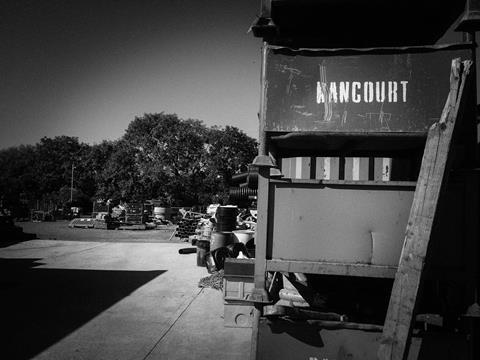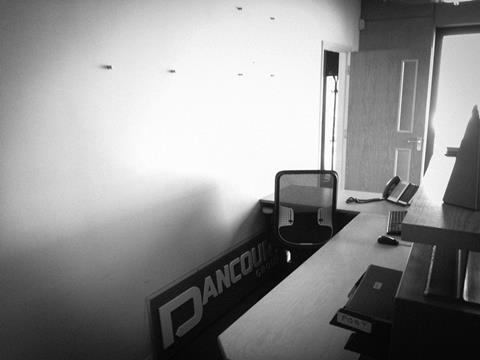After two decades building a successful small construction firm, old schoolfriends Richard Dors and James Sinclair found themselves toppled into administration by the type of chronic payment problems familiar to so many subcontractors. They tell Will Ing how it all went wrong – and how it feels to go under

‘One hundred per cent there is a sense of shame […] It affects your family; it affects you – of course it does.” Richard Dors is speaking in the kitchen of a cold, deserted building on an industrial estate overlooking Bristol. Dors’ firm Dancourt built its own office space, with a car park and construction yard out front – but all are now empty. Sipping tea in the corner is Dancourt’s other former owner – and Dors’ best friend – James Sinclair. He agrees with Dors: “There is that feeling of embarrassment, shame, failure, because we know the people further down the line.”
When Dancourt voluntarily entered administration on Tuesday 17 July this year, it owed creditors, including several other subcontractors, £5.3m – although it was itself owed £2.6m by principal contractors.
“As directors we couldn’t carry on,” Sinclair says. “Another fortnight and we wouldn’t have had enough money for wages, we’d have lost the offices, and personal guarantees would have kicked into place. It just focuses your mind when you could lose family homes and stuff; the risk suddenly became too big.
“You don’t sleep right, you’re waking up at 3 o’clock in the morning with a bank balance in your head”
James Sinclair, Dancourt
Set up in 2002, Dancourt grew from two employees to a firm that hovered around £15m in turnover between 2007 and 2018. It worked in civils, groundworks and earthworks, concrete frames and plant hire, operating across the South-west as well as occasionally beyond. At the start of July it had 89 permanent staff, seven apprentices and 50-odd further staff – all of whom have since been made redundant.
The firm worked with a slate of big contractors on jobs including Hinkley Point and Ashton Gate stadium in Bristol, as well as several school, university and supermarket projects. At its peak in 2014, the company made a pre-tax profit of £380,000. But in subsequent years profit more than halved while turnover crept up, as the firm found itself working on increasingly tight margins.
Here, the two Dancourt directors tell Building what it was like to see their business fall apart, what they’ve learned about the construction industry – and what they intend to do next.

A promising start
Sinclair is tallish, with a slightly ruddy face; he wears a crisp, checked shirt. Dors is shorter and stockier, sporting a substantial beard and a green sweater. He also wears a surgical support on one hand, keeping thumb and forefinger perpendicular to protect some fresh stitches between the digits following a motocross accident. They are 47 and 46 respectively, but were scarcely out of their twenties when they founded Dancourt (neither wanted to be photographed for this piece).
The pair became firm friends at school while studying for their GCSEs. Dors left school soon afterwards to follow his family into construction work, while Sinclair went on to university, for a degree in business studies.
Dors, says Sinclair, was the “muck and bullets, and I was the pricey, commercial side that met the clients, so it always worked quite well”. They cobbled together £10,000 for a transit van, a laptop and initial cash flow. “It was just repeat business at the start. We got a reputation, acquired a few blokes and grew steadily,” says Sinclair. “We never ever thought we’d get to where we got to.”
A period of steady success followed, lasting many years. Then in 2016 things began to turn. The firm suffered two “extremely tough” years before finally succumbing last year. The two owners say they tried everything to stay afloat: “We used our war chests and our savings and our accruals, sold plant, put money back in the business, reinvested, refinanced our plant,” Sinclair recounts. But it wasn’t enough. The directors personally sank £70,000 each into Dancourt during this period. They also lost money through another company, Breadmakers Ltd, a vehicle they used on advice from the banks to own and let Dancourt’s office and yard.
“The last two years – you don’t realise what it’s been like,” says Sinclair. “You don’t sleep right, you’re waking up at 3 o’clock in the morning with a bank balance in your head. Or you’re worried that the subcontractor is not going to get his money till Tuesday when it’s due on Friday. [Since entering administration] the comments I’ve had at home is ‘You’re back’ – because you just disappear into this pit of fighting, arguing, and it doesn’t make you a particularly nice person. By the time you are home at night you’re all wound up, you don’t really want to talk to anyone, so you go and cut the grass or kick the dog.”
Dancourt’s fatal blows were in July this year. The pair were expecting to agree several final accounts with clients for jobs they had completed. “We reckoned we’d get 80% of that and 50% of this and so on. Unfortunately, in the first two weeks of July, they didn’t come in.” Dors says undervalued final accounts were the real sticking point for Dancourt, but that they had to accept them because they needed the cash.
“Principal contractors know you have very little choice, because to go to any form of litigation – whether it be adjudication, arbitration – it’s an expensive process,” he says.
“We all play the game to a certain extent. I’m not going to sit here and say that our surveyors aren’t trying to maximise their valuation – they are. But you have principal contractors which are drastically undervaluing final accounts on a monthly basis.
“In the good old days, you could afford to do quick deals,” Dors adds, “but now everybody wins work on next to no margins at all. You hear of contractors securing jobs on negative margins – so then they have to find it during the job, and we all know what that means …”
Cash flow killers
But while Dancourt was owed £2.6m by main contractors when it went down, it owed more than twice that itself. The directors themselves are surprised by the gulf between what they were owed and what they owe in the administrator’s figures. One reason for this, they say, is that in the final weeks they accepted final accounts at knock-downs of hundreds of thousands of pounds in a last-ditch attempt to stay afloat – and, later, just to get money in for the creditors. Sinclair and Dors are also shocked at the size of the subsequent counter-claims by principal contractors, as well as at some of the names and numbers that feature on the list of creditors.
They do not expect the administrator, Jonathan Williams of accountant Bishop Fleming, to get back from Dancourt’s clients much of what they say was owed in order to pay its creditors. “I don’t think they have recovered anything, and I don’t think any of them will pay,” says Dors. “If they get anything back, it will be tiny.” Even Williams, in the administrator’s report, acknowledges: “Initial exchanges with the principal contractors on work which was ongoing when the company ceased to trade suggests, in the main, that contractors will claim that no funds will be given due to the extent of counter-claims.” As Building went to press, almost three months after Dancourt entered administration, less than £200,000 of the £2.6m it was owed had so far been recovered.
Some £157,000 of this was from a single contractor – the directors say this was for an account they valued at £491,000. They say the contractor claims Dancourt’s administration has cost it £300,000.
Some of the absent money comes from finished jobs. In July the pair signed off a £100,000 final settlement on a job they understood to be worth £500,000. Dors and Sinclair say the contractor had already sat on the final account for four-and-a-half months but promised to send a BACS payment on that day. The money never came. When Dancourt went bust a week later, the contractor kept the money, as it had a clause in its contract saying it could retain up to 10% of the overall value of the project from a company that entered administration.
“The principal contractors profit from subcontractors that enter into administration,” Dors says. “Without a doubt. You’ve got principal contractors that pay badly throughout and then all of them, I think without exception, once you push that administration button, will try and claw back whatever they can, because of that administration process.”
The decision to end it all
On Friday 13 July the directors sat down with the Insolvency Service to talk through their very limited options, and later that day they updated an inner core of Dancourt about what was to happen the next week. “Unfortunately, that got leaked out on Facebook on Saturday morning by one of the employees,” Sinclair recalls. “Sadly, some people learned over social media before they got spoken to properly.”
The directors addressed groups of about 10 staff at a time on Tuesday. Some were angry, but most were upset or worried about getting paid and getting new jobs. Some didn’t take anything in the first time they were told the company was folding, so had to have everything explained two or three times over by the directors. “We never had a high turnover of staff, so it did have a family feel to it,” Dors says. “A lot of people, the girls in the office, some of the key members out on site, they’d been with us since we started.”
Fortunately, staff found new jobs easily enough – particularly those working on site. “They were all on their phones at the weekend, and everyone went straight into a job,” says Sinclair. Dancourt was also able to pay all its workers for the jobs they had done.
“It’s a weird feeling, though. You go from flat out, 140 people around you and full tilt forward on Friday, to be sat here on Tuesday afternoon with a depleted staff,” Sinclair says. (While most staff were made redundant on 17 July, some administrative staff were retained until the end of July to tie up loose ends for the administrator – they were paid between remaining Dancourt funds and the Redundancy Payments Office.)
“It was very visual as well,” Dors adds, referring to the construction vehicles that would normally have been out on site or on the road. “We spent probably a month looking out of our window with 50 vans parked outside in the car park.”

On the last day, the directors took some of the staff around the corner for a pint. “I have to be honest: we weren’t in the mood.” Sinclair nods towards his partner and continues: “Me and him haven’t drunk for ages because if we get on it we’ll go for it. And it also doesn’t look right, does it? We’re only in BS3 Bristol [2km south of the city centre] – they all know where you work and what you do. I don’t think from the point of view of me and him rolling around Bristol drunk three weeks after … I’d hate to bump into someone.”
Dors jumps in: “I was going to go out with my missus on Saturday, and you find yourself not wanting to go out because you bump into people. It comes with all sorts of things like that.” His voice slows. “Dancourt sponsored my son’s rugby team, and he’s now got to deal with the embarrassment of the shirt that he wears to play his under-13s rugby. He’s playing a side over in … somewhere else and you’ll hear one of the parents go ‘well, they’ve gone bust now’ – you know what I mean?”
Picking up the pieces
Are the duo disillusioned with the sector they’ve always worked in? “I think fundamentally the whole thing is fucked. And we fucked it for ourselves,” Dors responds. “Principal contractors take less and less risk and responsibility for what they’re doing – they put more onus on their supply chain and we get no commercial reward for doing that.”
For all the frustration they have with main contractors, neither director thinks the buck stops with them. Sinclair articulates the situation: “It’s not that they’re making oodles of money, the main contractors. If they were making a fortune while still smashing the subbies up, then you’d go ‘this is wrong’. Someone is benefiting somewhere, but it’s certainly not the main contractors – and it’s certainly not the subcontractors.”

The directors express pride that they had eight apprentices, that they invested in training for their staff and took on a lot of youngsters. But it is hard for them to look back and say it was the right decision. “The reality is that the industry still supports a two-transit-vans-and-a-JCB-type service,” says Sinclair. “Cheapest price, cheapest price, cheapest price. And the sad thing is that one of us in the supply chain will do it. And if one of us will, the rest of us can’t sit back and watch. We’ve all sat back and said ‘that job’s too cheap,’ but ultimately when there is a hole in your income you’ll take that job.”
As they sit in their empty office building, the directors reflect on the past several months. “It flew by,” says Sinclair. “A complete whirlwind. Since Christmas, it’s just been a … I don’t even remember the World Cup.”
While they remain on site, winding down what’s left of the enterprise they started 16 years earlier, they are clear that they will both need to get jobs soon. (They also hope to let the office and yard.) Do they think they will work in construction? “Of course. It’s what we know,” says Sinclair. And will they work together? “Oh yeah, we’ll do something together,” says Dors. They do not rule out working for contractors either. “But I do genuinely want to do something that makes a difference,” Dors adds.
“There is a small sense of relief about Dancourt,” he concludes, “that perhaps you can concentrate on the rest of your life and try and move forward. But I’m frustrated with it, because you can see it could be so different.”


























No comments yet